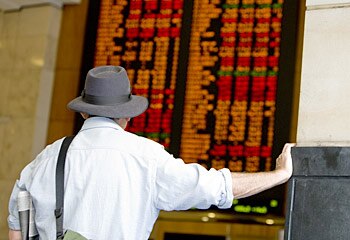Super savaged in share rout
AUSTRALIANS on the verge of retirement will have to stay in the work force for two or three more years as their super drains away.

Super savaged in share rout
AUSTRALIANS on the verge of retirement will have to stay in the work force for two or three more years as the share market plunged to its lowest close for nearly four years yesterday.
With the top 200 shares now down by 30 per cent since their peak in November, superannuation funds have been decimated.
Super funds are down 11 per cent this year alone, forcing people who were about to retire to continue working to repair their retirement savings.
"Average annual returns over the past five years have been about 9 per cent, so if you've calculated your retirement based on getting similar returns during the past year, your sums will be way off," Jeff Bresnehan of Superratings, the super specialist, said.
"You may have to face up to working for another year or two."
And there are fears that there is worse to come as the global economic slowdown spreads to China, threatening our resources sector which has been propping up the economy.
"This crisis has gone from the worst in a generation to the worst since the Great Depression" Josh Williamson, of TD Securities, said.
"This global slowdown will be worse than anybody expected."
The short-term outlook for shares is bleak as the world faces up to the worst financial crisis in 80 years. The collapse of Lehman Brothers - the fourth largest investment bank on Wall Street - and the panic sale of Merrill Lynch to Bank of America have illustrated that nobody is safe.
Worryingly for Australia, the global slowdown is bringing down the price of commodities - the backbone of the Australian economy, which will make it virtually impossible for the stock market to rise.
And bank shares, which are held by millions of "mum and dad" investors, continue to struggle because the financial sector faces such a rocky future.
Treasurer Wayne Swan has been quick to point out that Australian banks are more secure than their US counterparts, although both ANZ and NAB have written off about $1 billion in losses connected to the credit-crunch. Both announced yesterday about $100 million in further write-downs connected to the Lehman Brothers collapse.
Official interest rates are almost certain to be cut next month to bolster the economy. Most experts are predicting two RBA rate cuts of 0.25 per cent before the end of the year.
But it is doubtful whether banks will pass on the whole cut to customers because their costs of funds are rising amid the global turmoil.
Oil, which hit $147 only months ago, was trading at $91 yesterday, which should help motorists and help bring down inflation.
"The only good news is that inflation risks are subsiding pretty well everywhere as the global economy slows and oil and other commodity prices come down," Mr Robertson said.



